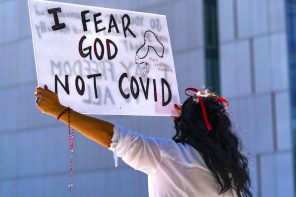As the Johnson & Johnson Covid-19 vaccine approached achievement of Emergency Use Authorization in the United States, some raised objections because it was developed using abortion-derived stem cell lines. In fact, the Moderna and Pfizer vaccines also have a distant abortion connection. Stem cell lines derived from aborted fetuses were used in testing those vaccines. These realities prompted statements from both the Vatican and U.S. Catholic bishops on how Catholics and others could ethically access vaccines. Their framing of this issue could have a far-reaching impact on religious thinking about how caring for individuals facing health challenges and promoting the “common good” may take priority over other ethical factors and could lead to a rethinking of some critical global health considerations for LGBTQ+ people, and ultimately to long overdue changes in health policy.
While maintaining their objections to abortion under virtually all circumstances, Vatican leaders said that “when ethically irreproachable Covid-19 vaccines are not available … it is morally acceptable to receive Covid-19 vaccines that have used cell lines from aborted fetuses in their research and production process.” (Congregation for the Doctrine of the Faith) The U.S. Conference of Catholic Bishops added, “While we should continue to insist that pharmaceutical companies stop using abortion-derived cell lines, given the world-wide suffering that this pandemic is causing, we affirm again that being vaccinated can be an act of charity that serves the common good.”
In fact, the Vatican directs people who hold a deep commitment against abortion not to use that as a reason for avoiding vaccination. The Pontifical Academy for Life states there is a “moral responsibility to vaccinate … in order to avoid serious health risks for children and the general population.” Preserving the health of those born into life is, appropriately, seen as the higher priority.
Granted, Covid-19, with over 128 million cases and 2.8 million deaths around the world reported to date, has created a global health crisis unparalleled since the 1918 flu pandemic claimed 50 million human lives. The need for effective prevention and treatment of infection is pressing and nearly universally accepted. But there are other health issues that have created staggering crises for humanity, especially those on society’s margins, where Catholic and other religious officials have balked at solutions that prioritize individual and community health over official teaching or dogma.
Among the most obvious collisions between church teaching and public health is the prevention of the transmission of HIV/AIDS. UN-AIDS, the United Nations agency, reports that at least 32.7 million people have died of AIDS through 2019, and approximately 1.7 million people become infected with HIV annually. Since early in the HIV/AIDS pandemic, science has proven that use of condoms is a key preventative measure that drastically reduces transmission of the virus.
Yet to this day, Catholic health care programs, which manage 26% of the world’s health care services and in many places are the only accessible health care provider, are barred from distributing condoms or educating people on their use. This continues to have a tremendous impact on the LGBTQI community, sex workers, the sexual partners of those infected with HIV, and children exposed to HIV in utero. It leads to incredible suffering, unnecessary illness, increased poverty, disruption of families, and death, especially for Black and brown people and others who are already poor and vulnerable.
A smaller but no less immediate crisis exists for people dealing with gender dysphoria, for whom Catholic officials also ban critical services. Lack of access to supportive health care increases the risk of depression, anxiety, substance abuse, homelessness, poor educational outcomes, vulnerability to violence, and suicide among transgender and nonbinary individuals. While the proportion of the population directly impacted by this crisis is relatively small, although no less deserving of dignified and compassionate health care than any other, the impact on families and society is much larger. Again, those who are already marginalized due to race or economic status are at increased risk of negative outcomes.
If Catholic officials can set moral considerations around abortion to the side in favor of the clear benefit of Covid-19 vaccination to individuals and the common good, could they not use a similar framework to address these and other considerations? Why should preserving lives and the common good be the highest virtues only for Covid? Should they not be the priority in how people of faith think about all health issues? What other ethical considerations should be brought to bear for LGBTQ+ people and other marginalized communities?
Covid-19 has shone a spotlight on numerous flaws in how our world responds to some of the most critical and life-sustaining needs of all. The management and distribution of health information and resources is clearly among the issues that must be rethought and reconstructed in the months and years ahead. Catholic and other faith-based health providers could be important partners in this reframing, through their health services, institutions of higher learning, and interactions with governmental institutions and policymakers across the globe.
If ensuring preservation of individual health and the common good can be applied consistently as the priorities for health care delivery, then LGBTQ+ people, Black and brown people, women, the impoverished, and others whose lives are often currently diminished will be far better served.





